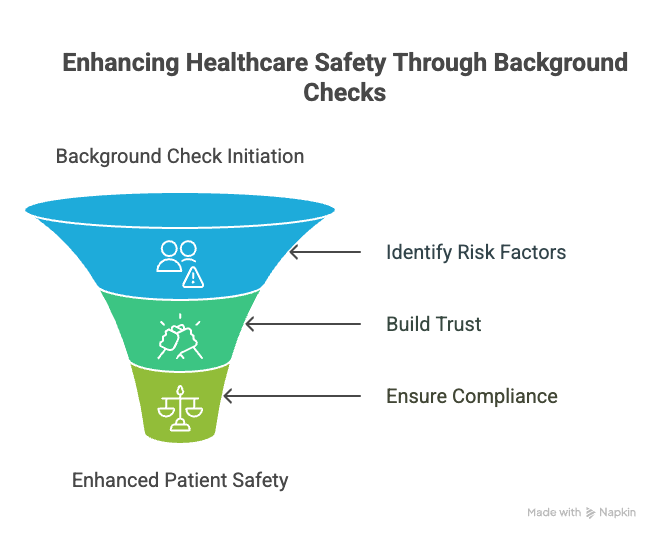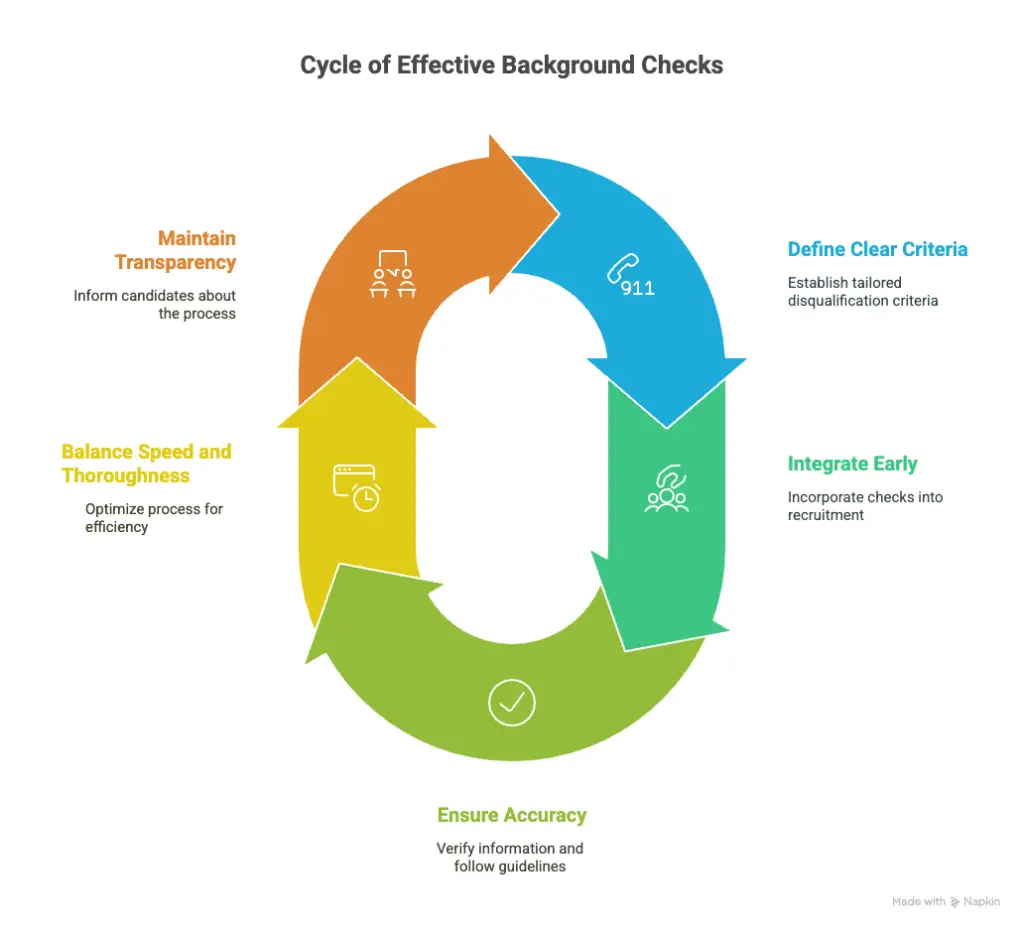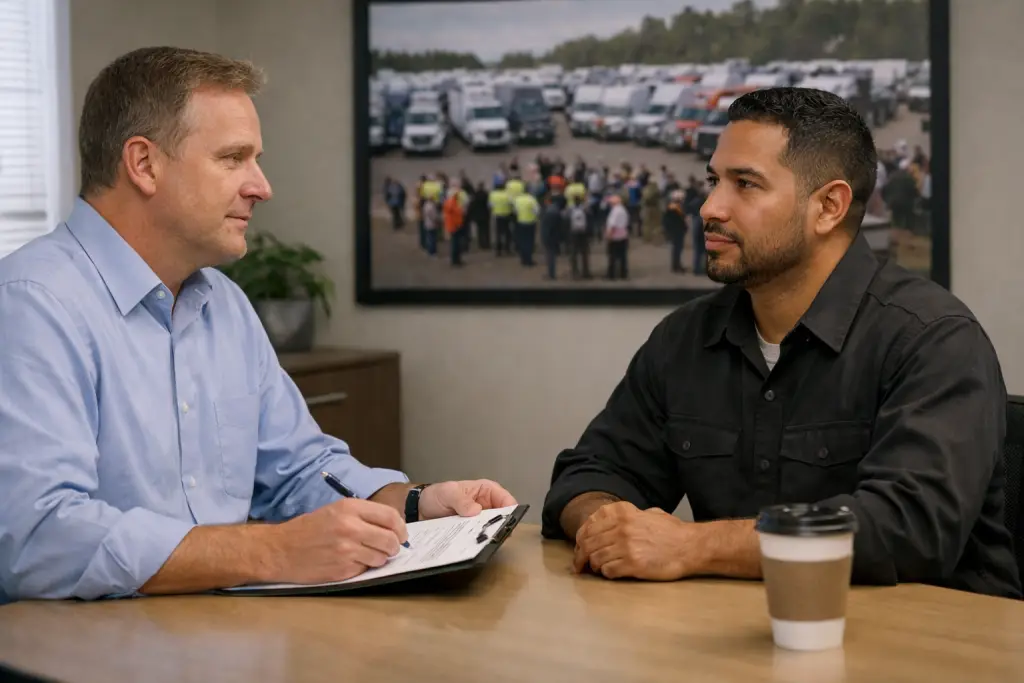In healthcare, ensuring patient safety is paramount. Background checks play a critical role in this process, ensuring that only qualified and trustworthy individuals are placed in positions where they care for others. This guide will explore how background checks contribute to patient safety, the various types of screenings used, and best practices for healthcare employers.
Key Takeaways
- Background checks in healthcare are crucial for ensuring patient safety and building trust between patients and providers.
- Conducting thorough criminal, OIG exclusion, license verification, employment history checks, and drug screenings ensures your staff are trustworthy and competent.
- Implement clear, consistent background screening policies early in your recruitment process to avoid errors and maintain accuracy.
- Balance thorough background checks with timely hiring to avoid delays that can impact patient care and facility staffing.
- Continuously monitor employees' backgrounds and train HR teams to handle background checks effectively using modern technology.
Introduction
Patient safety in healthcare settings isn't just a goal—it’s a necessity. Every healthcare facility, big or small, shares this commitment. But how do you ensure that those responsible for patient care are trustworthy and capable? This is where background checks come in. They're the silent guardians, working behind the scenes to protect patients by vetting healthcare professionals before they step foot in the ward.
Integrating comprehensive background checks into your hiring processes is crucial. Not only does it filter out candidates who might pose a risk, but it also reassures patients that they're in safe hands. This article delves into the critical role background checks play in maintaining patient safety, exploring the essential screening methods and offering practical insights for healthcare employers.
EXPERT INSIGHT: As an HR professional, I have witnessed firsthand how one new employee can significantly make a difference in healthcare—either positively or negatively. If a person hires on without a background check or proper qualifications, it can be dangerous for the workplace and harmful for patients. Therefore, background checks are not simply a process in our hiring; they are a part of our commitment to safety. Each nurse, technician, or administrator we consider demonstrates a promise: that we established trust, care, and safety with individuals and with one another. We shouldn't discover by accident how crucial it is to observe. We should act genuinely—with comprehension, supported by strong procedures, and continually considering the people we assist. - Charm Paz, CHRP
The Importance of Background Checks in Patient Safety
When you walk into a healthcare facility, you're placing your trust in the hands of professionals. For these individuals, background checks are a first line of defense in protecting patients, especially those most at risk. Vulnerable populations, such as the elderly, children, and immunocompromised individuals, depend heavily on the assurance that their caregivers are not only competent but also have a clean history. A comprehensive background check can reveal past behavior that could suggest risk, thus shielding patients from potential harm.
But protecting patients is just one piece of the puzzle. Rigorous background checks also build a foundation of trust between healthcare providers and patients. When patients feel confident that their medical staff have been thoroughly vetted, it enhances their overall experience and satisfaction with care. Trust is not easy to earn, especially in healthcare. It requires proof that those responsible for patient care are both qualified and reliable. Background checks help provide that proof, offering peace of mind.
Regulatory compliance is another critical aspect. Healthcare organizations have a legal and ethical duty to conduct thorough background checks. Many states mandate these checks, and failing to comply can lead to hefty fines and legal complications. Beyond that, ethical responsibility demands healthcare institutions do everything possible to ensure their staff won't harm patients. Evaluating an individual's background is essential to fulfilling this obligation.

In essence, background checks are not just procedural—they are protective and practical tools. They help secure patient safety, foster trust, and fulfill both legal and ethical duties. So, as a healthcare employer, how thorough are your checks? Are you doing everything possible to protect your patients and your organization? Consider these questions as you evaluate and update your screening processes.
Types of Background Checks Essential for Healthcare
You can't overstate the importance of background checks in healthcare. They are crucial for ensuring patient safety and maintaining trust. Here are the essential types that healthcare employers should focus on:
Criminal Background Checks: These are non-negotiable. Everyone from nurses to administrative staff needs to undergo criminal checks. You're looking for convictions that might disqualify someone from providing safe care. A clear check doesn't only protect patients; it also protects your organization from liability issues. For example, a nurse convicted of theft or assault might not be someone you want interacting with patients or handling their medications.
OIG Exclusion List Checks: The Office of Inspector General maintains an exclusion list of individuals and entities barred from participating in federal healthcare programs. Hiring someone on this list could mean losing federal funding or facing legal penalties. It's not just about ticking a checkbox; it's about due diligence in protecting both patients and your institution.
License and Certification Verification: Verifying credentials might seem straightforward, but missing this step can be costly. Verifying a physician's or a nurse's license ensures they are legally authorized to practice. An expired or falsified license puts patients at risk and tarnishes your organization’s credibility.
Employment History and References: Past performance often predicts future behavior. Verifying employment history and checking references can provide insights into a candidate's reliability and competence. A candidate might look stellar on paper, but former employers can reveal issues like absenteeism or misconduct that a resume won’t show.
Drug Screening: In a field where safety is paramount, drug screenings serve as a protection measure. Substance abuse can impair judgment and performance, risking patient care quality. Implementing thorough drug testing helps ensure that every hire is fit to provide safe and effective healthcare.
Each of these checks plays a specific role in safeguarding both your patients and your organization. Are your current processes robust enough to protect against potential risks? If you're unsure, it might be time to review your approach to background checks.
The Process of Conducting Background Checks in Healthcare
Creating a reliable screening policy is the bedrock of effective background checks. You should define clear criteria for disqualification, tailored to patient safety and legal standards. This ensures consistency and objectivity in decision-making. Integrating these checks at the early stages of recruitment streamlines your hiring process and prevents bottlenecks. Treat background checks as an integral part of recruitment, not an afterthought.

Accuracy is essential. Any errors or outdated information can lead to missed red flags or unfair disqualifications. Make sure your team verifies each piece of information and follows the EEOC guidelines to ensure fairness. Consider using automated tools to match records accurately and efficiently, minimizing human error.
Think about this: Are your checks balancing speed with thoroughness? If you let the process lag, you risk losing top candidates. Yet, rushing it might overlook critical details. Regularly review and update your background check procedures to balance these factors efficiently.
Finally, maintain transparency. Inform candidates from the outset about the background check process and what you aim to evaluate. An open dialogue fosters trust and reduces misunderstandings. These steps, when carefully executed, create a robust framework for hiring trustworthy healthcare professionals.
Challenges in Healthcare Background Screening
Conducting thorough background checks in healthcare comes with its own set of challenges. One of the biggest is balancing comprehensive screenings with the need for timely hiring. Delays in the hiring process can strain understaffed medical facilities, directly impacting patient care.
Handling borderline results in screenings often requires a nuanced decision-making approach. When a candidate's report shows unclear or borderline findings, it's crucial to weigh the specific job's requirements against any potential risks. For example, a minor misdemeanor from several years ago might not be relevant for a support role but could raise red flags for positions involving direct patient care or access to sensitive information. It's about making informed decisions based on both the details of the background check and the responsibilities of the role in question.
Legal and privacy concerns are also significant hurdles. Healthcare organizations must navigate complex federal and state regulations designed to protect candidate privacy while ensuring that the checks are thorough enough to identify potential risks. The Fair Credit Reporting Act (FCRA) is one such regulation that dictates how background information can be collected and used, requiring employers to obtain consent and inform candidates of their rights.
Staying compliant with these legal standards means continuously updating policies and training staff on privacy and data protection best practices. Failing to address these concerns not only jeopardizes patient safety but can also lead to legal repercussions for the organization. Balancing thoroughness with efficiency and maintaining compliance with evolving legal requirements is critical in ensuring that healthcare background checks effectively contribute to patient safety.
Risk Mitigation in Healthcare Hiring
Identifying Potential Risks: Thorough background checks are your first line of defense in identifying red flags early. Whether it's a past criminal record or discrepancies in a resume, these checks bring to light issues that could otherwise slip through unnoticed. Consider a nurse applicant with an undisclosed felony related to patient harm. A criminal background check can uncover this, allowing you to make informed hiring decisions.
Reducing Liability: Background checks also play a pivotal role in reducing organizational liability. By vetting candidates thoroughly, you protect your organization from negligent hiring claims. Imagine hiring a caregiver without conducting a proper OIG exclusion list check, only to find they're barred from federal healthcare programs. This oversight could lead to legal troubles and financial penalties.
Enhancing Overall Organizational Safety: Comprehensive screening is more than just a box to tick. It's integral to cultivating a safe environment for patients and staff. By ensuring only qualified and trustworthy individuals join your team, you foster a culture of safety and trust. This foundational layer of security supports broader efforts to maintain excellence in healthcare settings. Are your current hiring practices aligned with these risk mitigation strategies? If not, it might be time to reassess and strengthen them.
Best Practices for Healthcare Employers
Continuous monitoring is essential. It's not enough to conduct a background check once. Consider making periodic checks part of your protocol. Continuous monitoring helps to quickly identify criminal activity or licensure issues that might arise after hiring. This proactive approach can prevent potential safety concerns from developing into bigger problems.
Training your HR teams well matters. HR professionals are at the forefront of ensuring patient safety through hiring. Equip them with the necessary training on patient safety hiring practices and legal compliance. A well-trained team is more adept at identifying warning signals and ensuring that background checks are used effectively and fairly.
Embrace modern technology in your screening process. While traditional methods have their place, technology offers new ways to enhance efficiency and accuracy. Automated tools can speed up the screening timeline and reduce human error, providing a smoother experience for both recruits and recruiters. Automation can also help ensure compliance by tracking and documenting every step of the process.
Each of these best practices focuses on strengthening your organization's hiring framework. Implement them, and you'll be better equipped to protect your patients and your institution.
Frequently Asked Questions (FAQs)
How do background checks help ensure patient safety?
Background checks identify individuals with past criminal records, particularly those involving harm or abuse. By screening for these, you can prevent individuals with potentially harmful backgrounds from working in patient-facing roles. This protects patients from possible abuse or neglect.
What kind of background checks are required for healthcare workers?
Healthcare workers typically undergo criminal history checks, drug testing, and verification of education and professional licenses. For certain positions, checks might include looking into past employment and credit history.
Are background checks mandatory for hospitals?
Yes, background checks are mandatory for hospitals. Regulations often require hospitals to conduct these checks to maintain accreditation and ensure patient safety.
How often should healthcare workers be re-screened?
It is recommended that healthcare workers be re-screened annually. This ensures that any new issues, such as criminal activity or loss of license, are promptly addressed.
What happens if a healthcare worker fails a background check?
If a healthcare worker fails a background check, they may be denied employment or face corrective actions if already employed. The specific consequences depend on the severity and relevance of the findings to the position.
Can background checks reveal past patient complaints against healthcare workers?
Background checks might include disciplinary records from licensing boards, which can reveal past complaints or actions taken against a healthcare worker's license.
Are there specific background check requirements for different healthcare roles?
Yes, different roles may have specific requirements. For example, positions in pediatrics may involve more extensive checks due to the vulnerability of the patient population.
Do background checks for healthcare workers include social media screenings?
Some employers choose to review public social media profiles to assess professionalism and character, though this is not a standard component of all background checks.
How do background checks differ for temporary vs. permanent healthcare staff?
While both temporary and permanent staff undergo similar checks, temporary staff often require expedited processes due to urgent staffing needs. However, the same thoroughness is maintained to ensure safety.
Conclusion
It's extremely important to conduct background checks during employee hiring. They protect patients, gain trust from the company, and obey the law. Verifying items such as criminal history and licenses assists with protecting those who require care. A solid background check policy with technology assists with finding health care employees with care and expediency. As health care evolves, staying up to date with things, having solid policies, and ensuring HR employees are primed to maintain high standards are critical. In conclusion, background checks are not solely utilized with job applicants but are a demonstration of our respect to each patient who entrusts us with their care.

GCheck Editorial Team
Meet the GCheck Editorial Team, your trusted source for insightful and up-to-date information in the world of employment background checks. Committed to delivering the latest trends, best practices, and industry insights, our team is dedicated to keeping you informed.
With a passion for ensuring accuracy, compliance, and efficiency in background screening, we are your go-to experts in the field. Stay tuned for our comprehensive articles, guides, and analysis, designed to empower businesses and individuals with the knowledge they need to make informed decisions.
At GCheck, we're here to guide you through the complexities of background checks, every step of the way.






